Top Essential Oils for a Soothing Labor Experience
Navigating through labor can be a profoundly transformative experience, where comfort and calm become paramount. Essential oils, known for their therapeutic qualities, can provide significant relief during this time, enhancing both physical and emotional well-being. Selecting the right oils is crucial, as they vary in their soothing properties and effectiveness during childbirth. Lavender, clary sage, and frankincense are among the top choices, each offering unique benefits that cater to the intricate needs of laboring mothers. While lavender’s calming aroma supports relaxation, clary sage eases anxiety and tension, making the process more manageable. Understanding these options not only enriches the labor experience but also empowers individuals to embrace natural wellness practices effectively.
Recommended Essential Oils for Labor
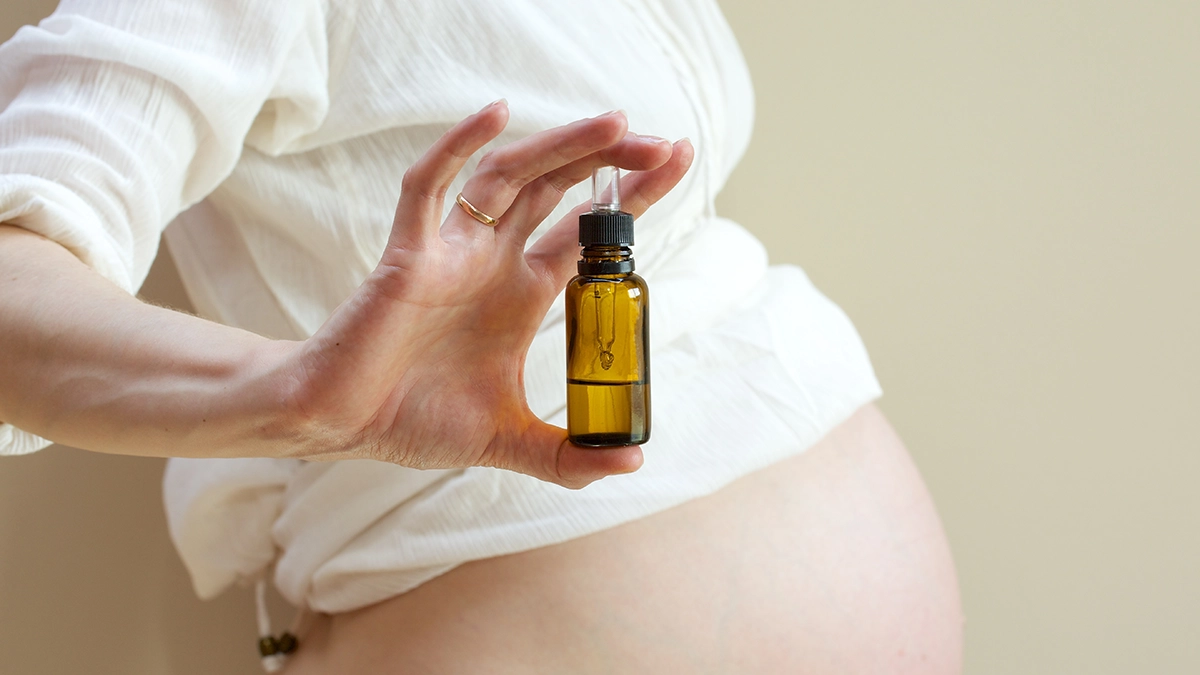
Selecting the right essential oils during labor can significantly impact the birthing experience. These oils can assist in managing pain, reducing anxiety, and creating a calming environment for both the mother and those present in the birthing room. Each oil offers unique therapeutic properties that can complement the natural progression of labor. The right choice of essential oils can enhance comfort and promote relaxation, but they should be used carefully to avoid any adverse effects.
- Lavender: Known for its calming effects, lavender can help manage stress and anxiety. It’s essential to use it cautiously because it might slow down labor if applied too early.
- Lemon: This oil provides an uplifting and energizing aroma, which can be particularly beneficial during longer labors and when a refreshing boost is needed.
- Peppermint: Effective for reducing nausea and invigorating tired mothers, peppermint can provide relief and increased energy during labor.
- Clary Sage: Favored for its ability to alleviate pain and anxiety, clary sage should only be used when labor is imminent, as it can stimulate contractions.
- Neroli: With its soothing floral scent, neroli helps in stress reduction and can stabilize the mood, promoting a sense of peace.
- Jasmine: Known for its uplifting properties, jasmine can reduce labor pain and anxiety, offering a comforting presence in the birthing environment.
- Frankincense: Aids in relaxation and grounding, providing a stable emotional state, which can be especially beneficial during intense contractions.
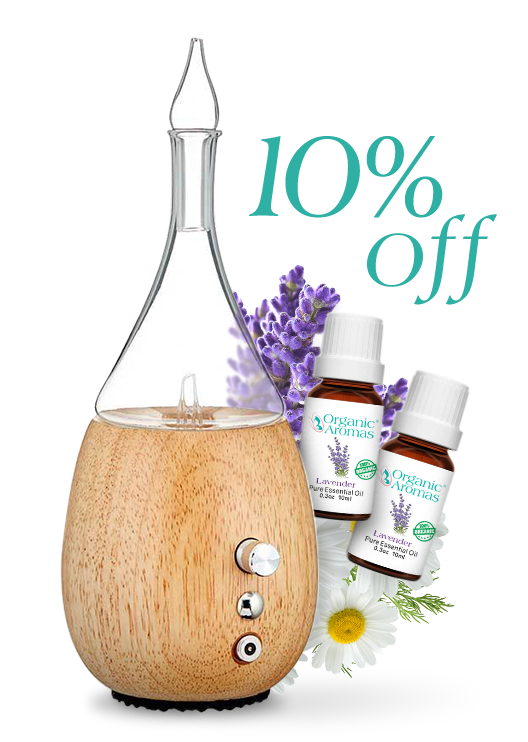
Join Now and Get a Coupon for 10% Off!
Using these essential oils with a nebulizing diffuser amplifies their benefits by preserving their therapeutic properties without the use of heat or water. This method ensures that the aromatic compounds are efficiently dispersed into the air, creating a soothing ambiance conducive to labor. Short diffusion intervals with breaks can prevent overwhelming scents, allowing the mother to benefit from the oils’ calming effects without becoming overstimulated.
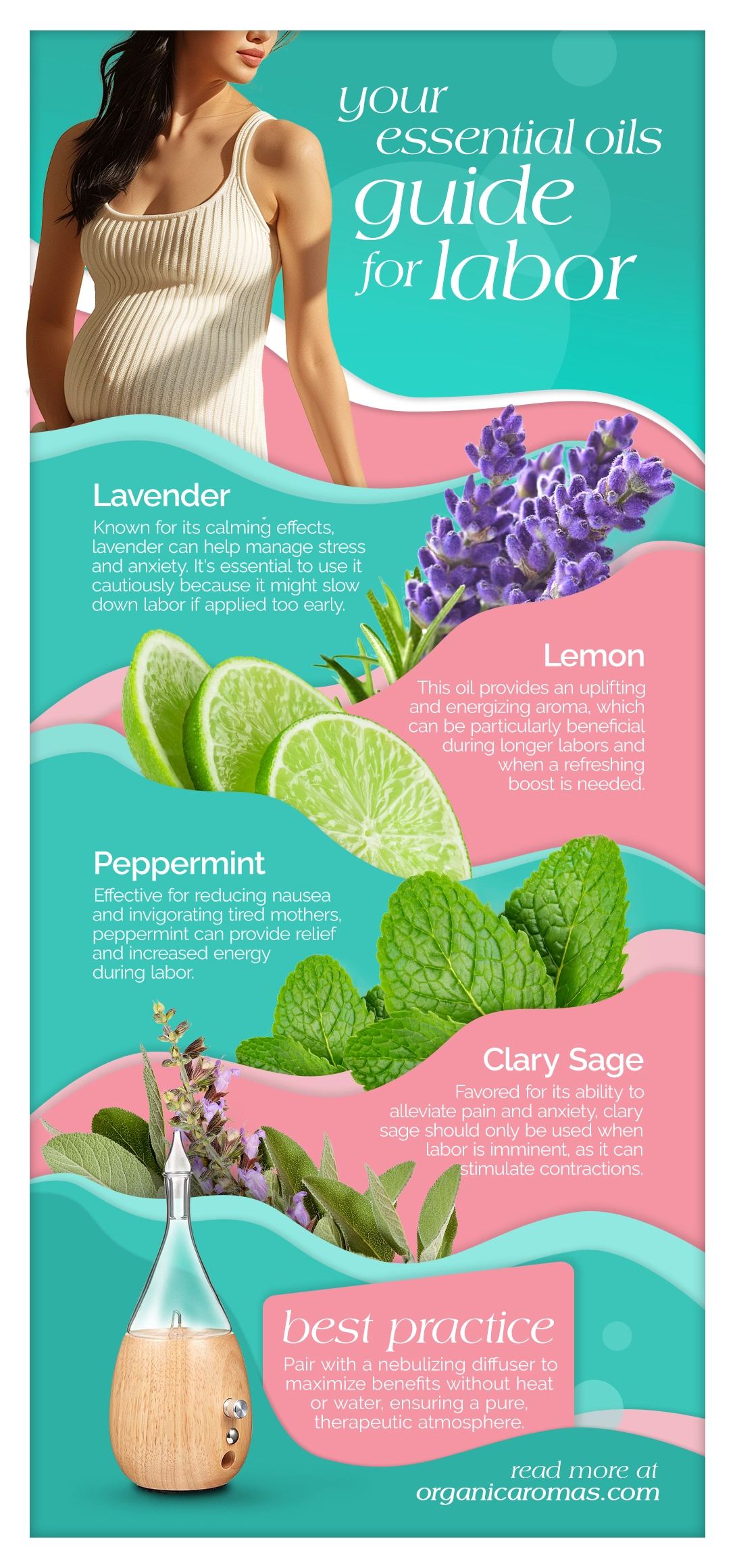
How to Use Essential Oils Safely During Labor

Safety is paramount when using essential oils during labor. Consulting with a healthcare provider is essential to ensure the oils chosen will not interfere with the birthing process or pose any risks, particularly in high-risk pregnancies. Professional guidance helps tailor the use of essential oils to the individual needs of the mother, ensuring both safety and effectiveness. It is also crucial to be aware of any contraindications, especially since some oils can impact labor progression or interact with medications.
Essential oils can be applied through various methods during labor, each offering different benefits. Diffusion is a popular choice, where four to six drops of essential oil are added to water and diffused for 30 minutes with intervals, preventing the aroma from becoming overwhelming. Direct inhalation is another method, providing quick and easy scent exposure without lingering odors. Massage can also be beneficial, though care must be taken to avoid direct skin application near the due date, as this could interfere with the baby’s natural scent recognition.
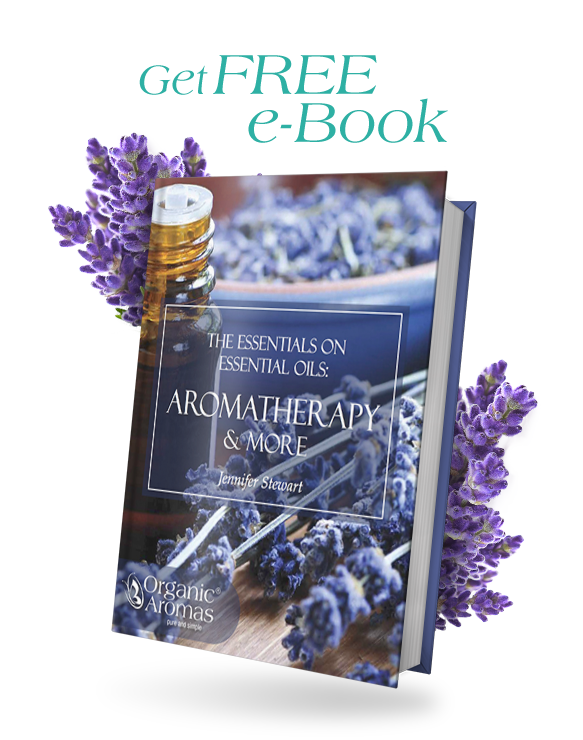
Sign Up to Get Your FREE
e-Book Here…
- Consult a healthcare provider to confirm the safety of chosen oils.
- Use a diffuser for controlled and temporary aroma exposure.
- Avoid direct skin application to maintain the baby’s scent recognition.
- Refrain from essential oil use during water births to prevent floating oils.
- Limit exposure duration to prevent sensory overload.
Avoiding common pitfalls ensures the safety of both mother and baby during labor. Overusing essential oils or choosing inappropriate application methods can lead to discomfort or unintended effects. By following expert guidelines and maintaining awareness of the mother’s and baby’s needs, essential oils can be a safe, soothing ally in the birthing process.
Creating a Labor Essential Oils Kit
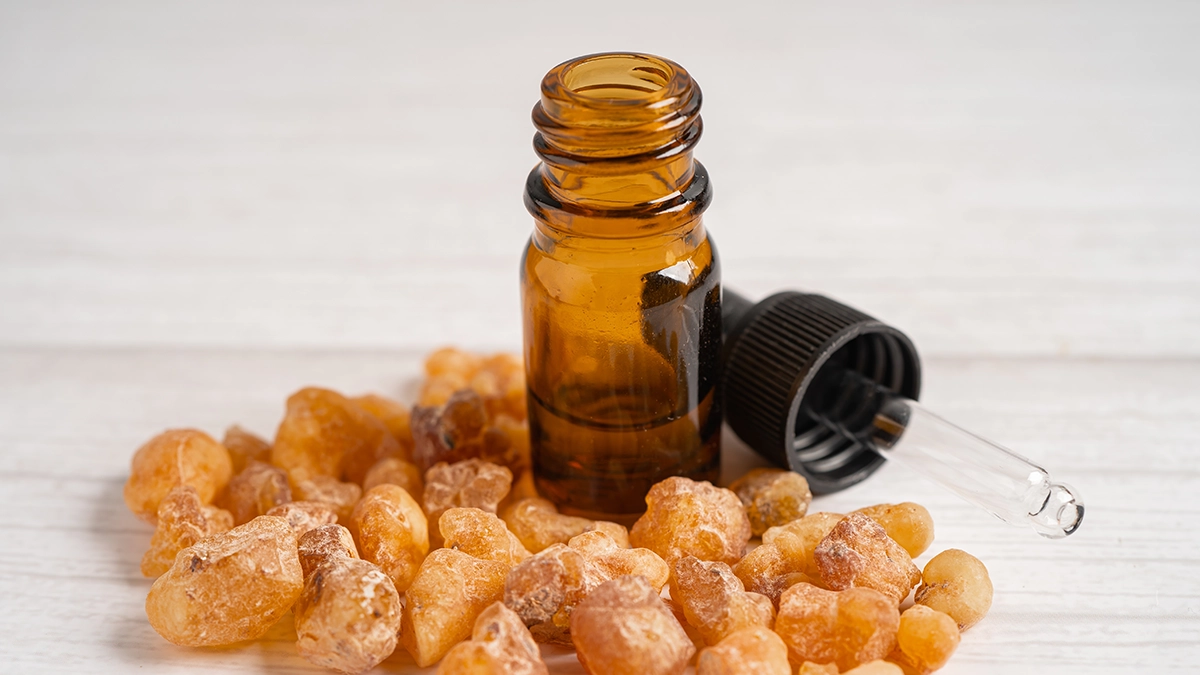
Having a prepared essential oils kit for labor can be instrumental in creating a calming and supportive environment during childbirth. A well-assembled kit allows for easy access to the oils and tools necessary to manage stress, reduce pain, and stabilize emotions. Essential oils like lavender, clary sage, and frankincense are staples in such kits due to their various beneficial properties. The inclusion of tools such as roller bottles and carrier oils enhances the application process, making it more convenient and effective. An essential oil locket also serves as a personal scent management tool, offering a customizable aroma experience.
| Oil/Tool | Purpose |
|---|---|
| Lavender Oil | Calming and stress relief |
| Clary Sage Oil | Pain alleviation and contraction stimulation |
| Frankincense Oil | Relaxation and grounding |
| Roller Bottles | Easy oil application |
| Carrier Oils | Diluting essential oils for safe use |
Popular brands like doTERRA and Young Living provide labor essential oils kits that feature blends specifically formulated for childbirth. These kits offer the advantage of pre-curated selections, which are crafted with quality and efficacy in mind. Personalizing your kit is key to ensuring it meets your individual preferences and needs. This can be achieved by selecting oils that align with your emotional and physical requirements during labor, as well as considering any personal scent preferences or sensitivities.
The Role of Clary Sage Oil in Labor
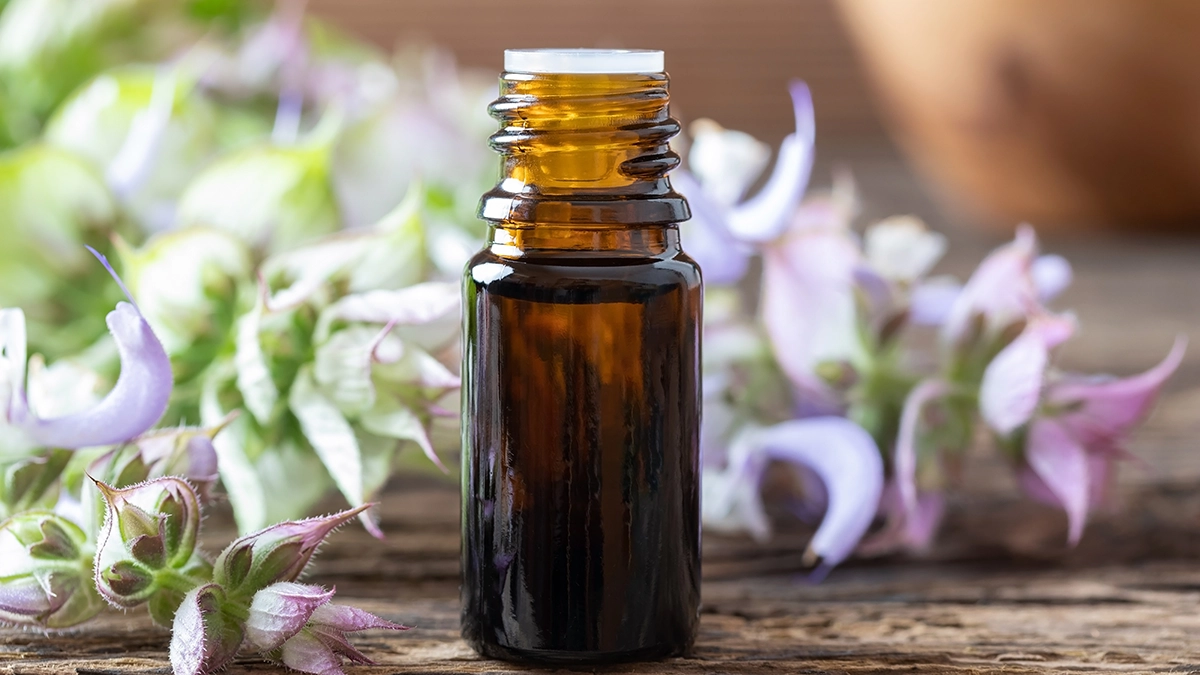
Clary sage oil holds a prominent place in labor for its labor-inducing properties, making it a favored choice for many expectant mothers. Known for its ability to alleviate pain, reduce fear, and ease anxiety, clary sage oil can be a valuable ally when labor is imminent. Typical application methods include applying the oil to the inner ankles or inhaling its aroma. This targeted approach helps in stimulating contractions and providing emotional soothing, enhancing the overall birthing experience. Clary sage is often included in blends like Clary Calm, specifically formulated to soothe contractions and promote relaxation during labor.
- Use only when labor is imminent to avoid premature contractions.
- Avoid high doses, as they can potentially slow down early labor.
- Consult with a healthcare provider before use, especially if there are medical concerns.
Incorporating clary sage oil into labor requires careful consideration and professional guidance. Its use in blends such as Clary Calm provides a balanced approach to managing contractions, but only under the supervision of a healthcare provider. This ensures that both the mother and baby’s health are prioritized, while maximizing the oil’s benefits without unintended consequences.
Benefits of Aromatherapy in Labor Using Nebulizing Diffusers

Aromatherapy during labor offers significant benefits in managing pain and reducing anxiety, creating a calming environment for the mother and all present in the birthing room. Essential oils like lavender and frankincense are highly favored for their soothing properties. A nebulizing diffuser is particularly effective in this setting as it disperses the oils without the use of heat or water, preserving their therapeutic qualities. This method ensures a full-bodied aroma that enhances the labor experience, contributing to a more relaxed and focused atmosphere.
- Preserves Therapeutic Properties: Nebulizing diffusers maintain the full potency of essential oils, unlike heat-based diffusers which can degrade the oil’s efficacy.
- No Water Needed: These diffusers do not dilute the oils with water, allowing for a pure, undiluted aroma.
- Efficient and Intense Aroma: The atomizing process ensures a more concentrated and effective dispersion, covering the room quickly.
- Easy Maintenance: Without water or heat, nebulizing diffusers require less frequent cleaning compared to other types.
For optimal aromatherapy benefits during labor, it is advisable to use short diffusion intervals with breaks, preventing the scent from becoming overpowering. This approach helps maintain a balanced aromatic environment, allowing the mother to reap the benefits of essential oils without sensory overload. Incorporating aromatherapy with a nebulizing diffuser not only supports the physical aspects of labor but also promotes emotional well-being, contributing to a holistic birthing experience.

Join Our Exclusive Member Club to get Big Discounts!
To conclude, choosing the best essential oil for labor can significantly enhance the birth experience by promoting emotional well-being and physical comfort. Each recommended oil offers unique benefits, from calming anxiety to invigorating the senses, aiding in a more serene labor environment. When incorporated thoughtfully, these oils can serve as valuable tools for expectant mothers seeking holistic support during childbirth. Always prioritize safety and consult healthcare professionals to ensure these natural solutions align with individual needs and circumstances.
FAQ
What essential oils are good for labor?
Essential oils can be used during labor and delivery through diffusion, massage, or inhalation to promote relaxation, manage pain, and reduce anxiety. Always consult a healthcare provider before use to ensure safety, particularly regarding concentrations and potential contraindications. Oils like lavender and clary sage are popular choices due to their calming and uterotonic properties, respectively.
How to use essential oils for labor and delivery?
Essential oils can be used during labor and delivery through diffusion, massage, or inhalation to promote relaxation, manage pain, and reduce anxiety. Always consult a healthcare provider before use to ensure safety, particularly regarding concentrations and potential contraindications. Oils like lavender and clary sage are popular choices due to their calming and uterotonic properties, respectively.
What is the best oil to induce labor?
Clary sage is commonly cited for its potential to stimulate contractions and support labor progress. It is recommended to use it only under professional guidance when labor is imminent. Clary sage may be diffused or applied topically (diluted with a carrier oil) to areas like the lower abdomen.
What scent is good for labor?
Lavender is excellent for relaxation and stress relief during labor. Peppermint can help invigorate and alleviate nausea, while frankincense supports calmness and focus. These oils can be diffused in the delivery room or used in inhaler sticks.
How can a labor essential oils kit help?
A well-prepared labor essential oil kit ensures readiness and convenience. Such kits might include pre-blended oils in roller bottles, diffusers, and carrier oils for dilution. Having a variety of oils like lavender for relaxation, clary sage for labor induction, and peppermint for energy helps address different needs during labor.
How should clary sage oil be used in labor?
Clary sage oil can be applied in a diluted form to acupressure points, such as the ankles or lower abdomen, or inhaled through diffusion. It is crucial to use it only when labor is already progressing to avoid premature contractions. Avoid overuse, as high doses can potentially counteract its effects.
Why use nebulizing diffusers for labor aromatherapy?
Nebulizing diffusers are ideal because they disperse pure essential oils without heat or water, maintaining the therapeutic properties of the oils. They are especially beneficial for short, effective diffusion intervals, helping to create a relaxing or invigorating atmosphere as needed.

